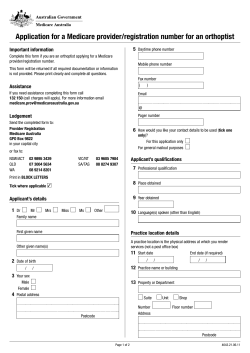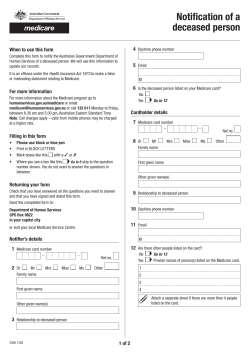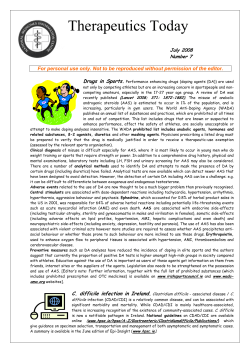
Denials, Audit and Appeals: How to Prevent the Small Issues From 6/8/2014
6/8/2014 YOUR DATES HERE YOUR LOGO HERE Denials, Audit and Appeals: How to Prevent the Small Issues From Becoming Big Problems? Matt Sivret, PT, Division Vice President Clinical Operations RehabCare Vienna Lafrenz, OTR/L, Director Clinical Performance SpecialistRehabCare 1 6/8/2014 Denial/Appeal Process Overview Steps in the process Ways ADRs/Claims are Reviewed 1. Additional Development Request (ADR) 2. Appeals 3. Redetermination 4. Reconsideration 5. Administrative Law Judge (ALJ) 6. Appeals Council Review 7. Judicial Review in US District Court • Pre Pay – Claim is reviewed before the provider gets paid for the service • Post pay – Claim is reviewed after the provider has received payment in full 3 ADR Overview • The facility will receive notice via the Medicare online system/FISS/DDE system of an ADR for a claim. • The Medicare online system/FISS should be checked regularly (daily is recommended for sites on active review, weekly at minimum) for ADRs, denials, and outcomes of appeals. • If an ADR is received, the provider should respond as quickly as possible • RESPONSE TIME IS CRITICAL 4 2 6/8/2014 ADR Overview • Submit all documentation from start of care through the denied period to support the billed services. • Respond to the ADR request within the time frame set forth by the request (usually 30 days) or the claim will be automatically denied at day 45 with reason code 56900. • Retain an exact copy of the information sent in for the ADR (if the claim is denied, paperwork does not have to be reassembled for the appeal submission). 5 Recent Denial Trends/Risk Areas Part B diagnosis edit denials: • Facility bill (UB04) is missing ICD9 code(s) from the MAC’s LCD(s) to support all billed therapy disciplines Medical Necessity • PLOF (Prior level of Function) - should be clear, objective, functional, measurable, recent, discipline-specific and relate back to the reason for referral; PLOF must address all areas targeted by goals and support there has been a decline • Reason for referral - Lack of physician/nursing (including MDS) documentation to support functional change • Evaluation results - must support there has been a change to support initiation of services • Lack of steady, significant progress/duration not supported - Progress should be expected within a reasonable amount of time. Patients on caseload for extended LOS are at risk for review (includes Part A patient who exhaust their benefits & continue rehab under Part B). 6 3 6/8/2014 Recent Denial Trends/Risk Areas Medical Necessity • Goal progress must be clear • Baselines for goals must be on the evaluation • Don't change how the goal is measured from week to week • If a goal is added during the course of treatment, state the baseline • Each week, the reviewer needs to see the status of the goal until it is met or discontinued • Discharge note must identify status of each goal – Lack of skilled treatment. Documentation should reflect the unique skills/clinical expertise provided by the therapist. Cues for safety, patient/caregiver observation, monitoring, and general endurance training are not considered skilled by Medicare. Daily notes should not read like a status report only. – Negative behaviors. Documenting patient “confused”, “agitated”, “noncompliant”, etc., often cited as denial reasons. Instead, state positive prognostic indicators despite these barriers to function. 7 Recent Denial Trends/Risk Areas Technical issues: • Missing records • Illegible records due to poor handwriting or poor copies (i.e. too light, cut off, crooked) • Illegible, missing or incomplete date on MD signature without a “received on” date provided • Date on MD signature outside 30 day window • Failure to complete the frequency and duration on the evaluation or recertification • Failure to include “from” and “to” dates on the certification / re-certification • Duration on the treatment plan does not match “from” and “to” dates on the certification / re-certification • Treatment continues outside the established certification period(s) • Failure to include long term goals (required by Medicare) for short term patients • Failure to include duration on long term goals and/or objective, measurable long term goals 8 4 6/8/2014 Jimmo VS Sebelius • Settlement Jan 23, 2013 • Clarified that MAC’s can’t apply “improvement standard” in determining coverage • CMS published multiple revisions to the Medicare Benefit Policy Manual in December 2013 • Coverage for Therapy Maintenance Services: Need for Skilled Personnel Skilled therapy services to maintain the patient’s current condition or prevent or slow further deterioration are covered under the SNF, HH, and OPT benefits as long as an individualized assessment of the patient’s clinical condition demonstrates that the specialized judgment, knowledge, and skills of a qualified therapist (“skilled care”) are necessary to design or establish a safe and effective maintenance program or under certain circumstances, for the actual performance of such a program. • Coverage for Therapy Maintenance Services: Complexity of the patient or service Skilled therapy is necessary for the performance of a safe and effective maintenance program only when (a) the particular patient’s special medical complications require the skills of a qualified therapist to perform a therapy service that would otherwise be considered nonskilled; or (b) the needed therapy procedures are of such complexity that the skills of a qualified therapist are required to perform the procedure. YOUR LOGO HERE ADR Hints • Most ADRs are received electronically. It is the provider’s responsibility to monitor the Medicare online system to identify suspended therapy claims • At the facility level, it is important to respond to ADRs in a complete and timely manner in order to avoid claims processing delays and possible denials. For best results, follow these guidelines for submitting documentation: – Respond to ADRs within 30 days of the date of the ADR. Automatic denials will be issued for late ADRs. – Be sure to forward the requested documentation to the correct address noted on the ADR. – Send each claim in separate envelope or folder or binder clip and attach a copy of the corresponding ADR request. 10 5 6/8/2014 ADR Hints • Send the records via certified mail or with signature confirmation in order to verify delivery. Include ALL records necessary to support the services for the dates requested. For Part A claims, this includes all records from facility admission through the period under review (including hospital records for the qualifying hospital stay). For Part B claims, this includes all records from therapy evaluation through the period under review. • Keep a tracking log of records sent for ADR and timelines to expect responses • Records must be complete, legible, straight on the page and singlesided copies only. Denials will be issued for missing/incomplete/illegible information. 11 ADR Hints Other helpful information: • All services must include necessary signatures and credentials of professionals. Include signature logs for MD/NPP and therapists. • For Part A claims, if a COT OMRA was completed that changed the RUG level at the end of the month in review, please include records for this observation period even if they extend into the following month. • Nursing documentation can be included with the Part B ADR if it supports the need for therapy services and/or carryover of functional improvement. Routine nursing notes should not be included. 12 6 6/8/2014 ADR Hints Non-therapy records can be included to help support the following: • Prior Level of Function — Include records that support the PLOF documented by therapy on the evaluation and describe the level of functional ability before the decline (for any areas of decline) • Current decline and/or change in status warranting therapy referral--- include supporting documentation that explains why the pt was referred to therapy and describes a decline in level of functional ability • Carryover of therapy gains/training---Documentation in the nursing notes, MDS, ADL log, dietary and/or MD progress note should support what positive changes have occurred with therapy services. Include any documentation that describes any improvement in the specific areas being treated by therapy and/or supports carryover from therapy • The Therapy Program Director is the BEST resource for determining which nontherapy records may be most helpful to include with the therapy claim. A collaborative effort between therapy, medical records and nursing is recommended to make sure the best possible packet is sent for review 13 Repairing The Record – If SNF documents are missing physician dates/signatures or if dates on MD signature are incomplete, illegible or missing – staff may add a “received” date (if known) to clarify the date of the MD signature OR may need to prepare a delayed certification for the MD to sign to include in the ADR package – If copies or handwriting are illegible and better copies can not be obtained, print or type out an exact copy of the original and submit with the original with instructions that this is an exact copy being submitted with the original to assist with legibility – If information (such as prior level of function and reason for referral) is incomplete or missing, therapist/physician may complete an addendum statement to clarify the missing or incomplete information that will be submitted with the medical record; the addendum statement needs to be dated the day it is written – If key errors are present in records explain them, i.e. MD admission assessment is late, obtain documentation from MD to explain cause 14 7 6/8/2014 Managing Cash Flow • Recoupment will begin on the 41st day from the date of the letter unless the contractor receives one of the following within 30 calendar days from the date of the demand letter: – Payment in full (eliminates the risk of paying high interest on unsuccessful appeals). – A request for an immediate offset (reduces/eliminates amount of interest assessed). – A request for an extended repayment schedule. – A valid redetermination request (1st level appeal). • The provider has the opportunity to submit a rebuttal statement and accompanying evidence within 15 days from the date of the demand letter indicating why the overpayment action will cause a financial hardship & should not take place. A rebuttal does not take the place of an appeal and is managed solely by the provider. • Option for facility to keep payments while claim in the appeal process called “Stop Recoupment” • Requires following quicker deadlines Stop Recoupment Traditional Deadlines Stop Recoupment Deadlines Redetermination 120 days Redetermination 30 days (75% less time) Reconsideration 180 days Reconsideration 60 days (66% less time) ALJ 60 days ALJ 60 days • Interest begins to accrue on the 31st day from the date of the demand letter. Accruement continues until the debt is fully satisfied (paid in full or overturned at appeal). Interest rates fluctuate, currently reported at 10.25% but have been as high as 11.375% in recent years. 16 8 6/8/2014 Acronyms • MAC- Medicare Administrative Contractor – Primary contact between Medicare program and providers – Providers submit claims to MAC for payment • RAC- Recovery Audit Contractor – Job is to ID and correct improper payment made by CMS • ZPIC-Zone Program Integrity Auditors – Investigate Fraud and Abuse • TMR- Targeted Medical Review When should I be Worried? • Edits vs. ADRs vs. Medical Review – Edits Usually line item denials that catch coding errors or timeline errors – Are we catching errors prior to month end close – Timely submissions? – ADRs – one or two claim sample to determine if stable process is in place in the facility Quick sample to assess need for further review – We need to pay attention, could lead to a probe… – Medical Review – Multi-claim review, usually suspicion related to utilization of services: RAC, TMR, ZPIC First sample can lead to additional records requested – Critical to handle each record carefully and ensure the best foot forward 9 6/8/2014 What is happening with RACs now? • Currently CMS is in procurement process for new RAC contracts • Changes implemented during transition period • February 21 is the last day a Recovery Auditor may send a post payment Additional Documentation Request (ADR) • February 28 is the last day a MAC may send prepayment ADRs for the Recovery Auditor Prepayment Review Demonstration • June 1 is the last day a Recovery Auditor may send improper payment files to the MACs for adjustment Questions? 10
© Copyright 2025












![Safety data sheet 1 Methylamine tungstate [ 1g ]](http://cdn1.abcdocz.com/store/data/000125087_1-fbdc786dee6fa149d5d896239acdf2bc-250x500.png)








